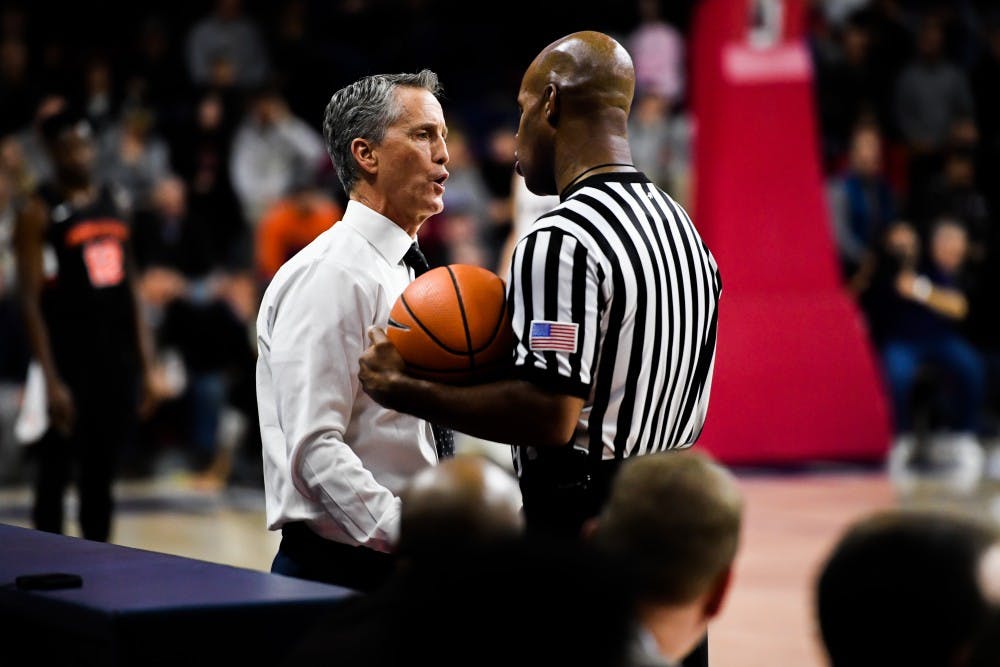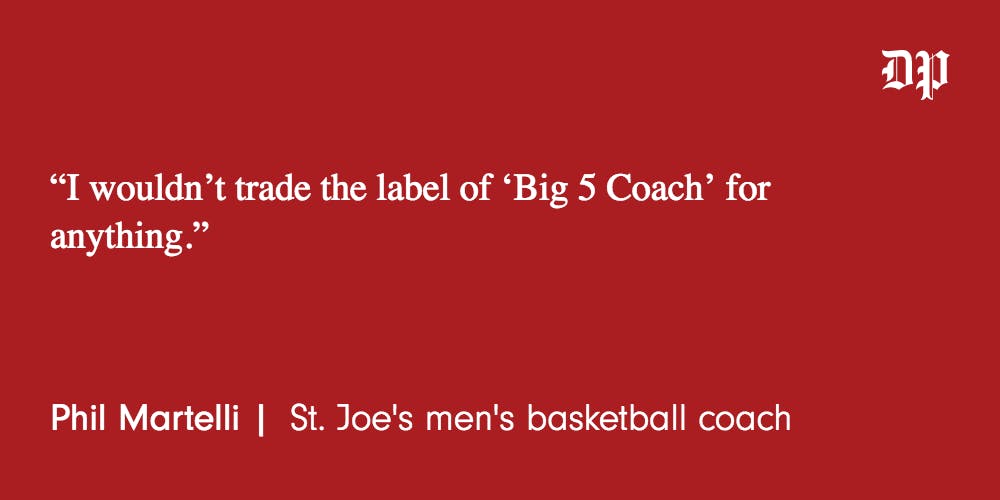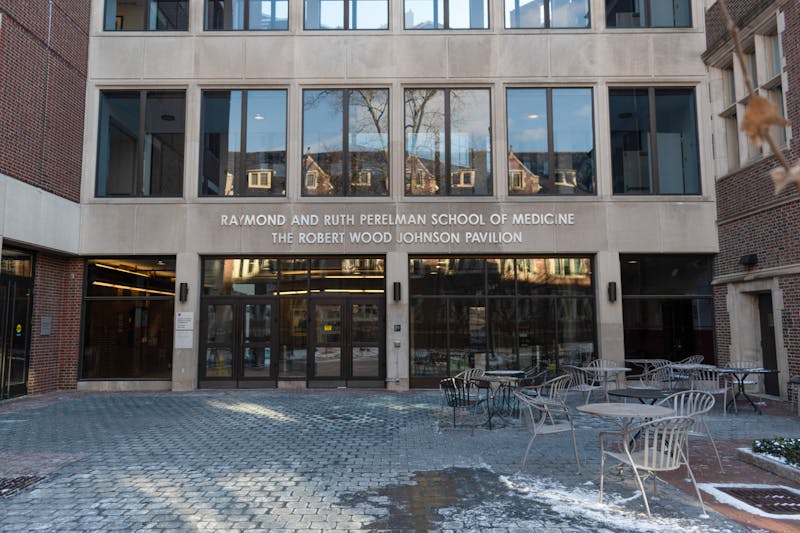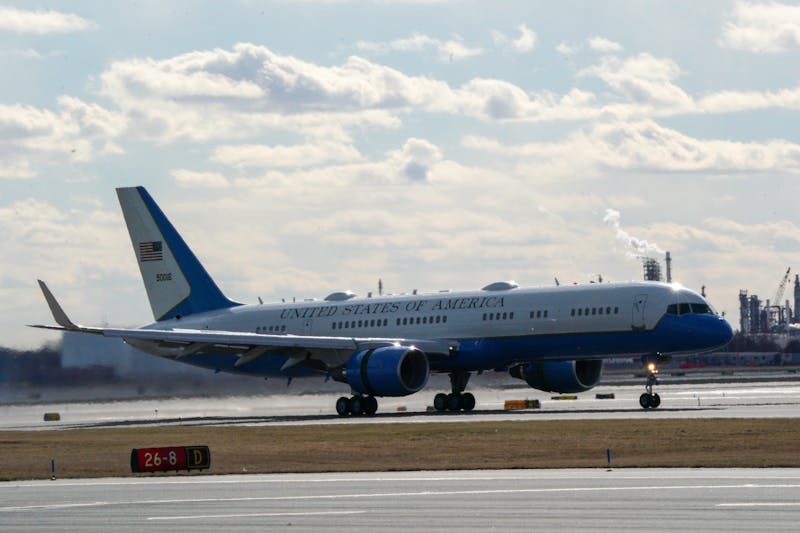
Though Penn men's basketball coach Steve Donahue is in only his third season as the Quakers' leader, his connections to Philadelphia basketball run far deeper than that.
Credit: Chase SuttonBig 5 basketball is special.
The history, tradition, and passion of the Philadelphia Big 5 — a basketball mini-conference including Penn, Villanova, Saint Joseph's, La Salle, and Temple — is truly unique. With five consistently strong Division I programs all within 20 miles of one another, there is nothing else like it in all of college basketball.
A major part of the Big 5's special nature is the unparalleled relationships that the different coaches in the conference have with one another. These relationships, based on mutual respect, competitiveness, and shared experiences, create one of the most remarkable coaching fellowships in the country.
“Each and every one of us is the other's biggest fan,” Saint Joseph's coach Phil Martelli explained. “We pull for the other teams.”
“All of us in the Big 5 are really close,” Penn coach Steve Donahue said. “I’ll get text from guys after this game [against Temple].”
Sometimes coaches simply say this about the other teams in their conference. But after spending time talking to the coaches of the Big 5, you realize they genuinely support their own and want them to succeed.
When Donahue was asked about Villanova in his press conference following a loss to Temple, he offered praise for the spectacular job that “one of our own” had done and called the Wildcats' current run of success one of the greatest in the history of college basketball. Martelli texts the other coaches if they get a big win or if they land a prized recruit. Fran Dunphy, Temple's coach and former Penn legend, praised the job that Donahue has done after he described how talented the rest of the Big 5 was.
“I wouldn’t be here without Fran,” Donahue said. “I was a real bad Division III player with no experience, and he took me on his staff. He’s a very good tactical coach, but he’s way more about people and relationships and how he treats people, [and from] that I learned a great deal.”
Even when the buckets aren’t dropping, the coaches all support one another and are quick to let their brethren know that they are not alone.
“In the toughest time [I try to text the other coaches],” Martelli said. “[To] let them know we’re thinking about you, things will get better. And they do the same.”
One reason why the coaches might be so supportive of one another is because they’ve all been around one another for a long time.
Martelli’s career at St. Joe’s began in 1985 as an assistant coach before he became head coach in 1995. Jay Wright has been the coach at Villanova since 2001. John Giannini of La Salle has been in the conference since 2004. Finally, Dunphy, who has been nicknamed “Mr. Big Five,” is well documented as being a part of the Big 5 for the better part of the conference’s existence. He played at La Salle from 1967-1970, was later an assistant coach at La Salle (twice), was the head coach at Penn for 17 years, and is now in his 12th season as the coach of the Owls.
Donahue is the shortest tenured head coach in the Big 5 with only three years of experience leading the Red and Blue. But when you factor in his 10 years coaching as an assistant at Penn under Dunphy, he is right up with the other coaches in terms of familiarity and experience with the league.
“At a lot of places, there might be a quick reaction to a downturn,” Martelli explained when asked why the coaches in the Big 5 have coached in the league for so long. “But in Philly you’re measured by the man you are, more so than the results you’ve produced.”

In fact, the coaches share a personal connection to Philadelphia. All of the coaches, except for Giannini, were born in Philadelphia. Of those four, only Wright did not attend college in the greater Philadelphia area.
The coaches also stay aligned through the Philadelphia section of Coaches vs. Cancer, where they attend events and host Q&A’s in order to increase cancer awareness.
Being from Philadelphia and understanding the history of the Big 5 and what it stands for, gives the coaches a different perspective on what it means to coach in the league.
“You realize you’ve been given a responsibility,” Martelli explained. “You’ve been given the keys to a house, and all you’ve been asked is to not burn the house down.
“I wouldn’t trade the label of ‘Big 5 Coach’ for anything,” he added.
“It’s a unique city,” Donahue emphasized. “College basketball in this city is passion, its huge. I’ve been in another city, this [much interest] doesn’t happen. [Philly] is a fun place to coach, you get the Eagles chant in the middle of the game. They’re not doing that in Boston for the Patriots.”
It shouldn’t be surprising that the Big 5 coaches are such a respected and special group; nowhere else in the country can you find four out of five teams from the same city who rank in the top 40 all-time in DI wins.
Regardless of what happens on the court, win or lose, the coaches of the Big 5 will be supporting their own through and through.
“We don’t break bread, or muck it up,” Martelli explained. “But the other coaches in Philadelphia know, we’re watching each other and hoping for success.”
“It’s an extraordinary fellowship.”
The Daily Pennsylvanian is an independent, student-run newspaper. Please consider making a donation to support the coverage that shapes the University. Your generosity ensures a future of strong journalism at Penn.
Donate






